 Petzlover
Petzlover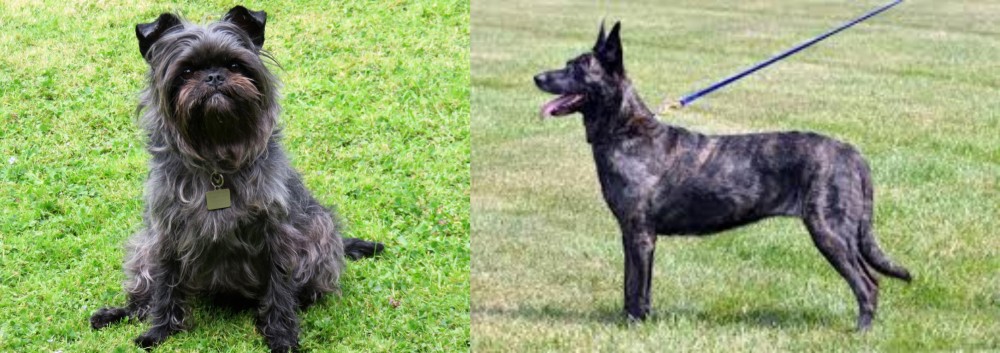 Affenpinscher is originated from Germany but Dutch Shepherd is originated from Netherlands. Affenpinscher may grow 32 cm / 12 inches shorter than Dutch Shepherd. Affenpinscher may weigh 26 kg / 57 pounds lesser than Dutch Shepherd. Both Affenpinscher and Dutch Shepherd has almost same life span. Affenpinscher may have less litter size than Dutch Shepherd. Affenpinscher requires High Maintenance. But Dutch Shepherd requires Moderate Maintenance
Affenpinscher is originated from Germany but Dutch Shepherd is originated from Netherlands. Affenpinscher may grow 32 cm / 12 inches shorter than Dutch Shepherd. Affenpinscher may weigh 26 kg / 57 pounds lesser than Dutch Shepherd. Both Affenpinscher and Dutch Shepherd has almost same life span. Affenpinscher may have less litter size than Dutch Shepherd. Affenpinscher requires High Maintenance. But Dutch Shepherd requires Moderate Maintenance
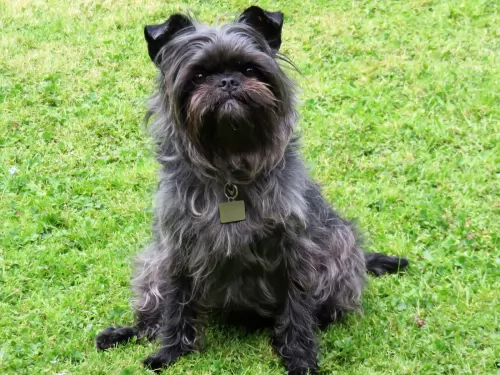 This breed originated from Germany. The latest information on this breed is from the 17th century. Actually, Affenpinscher got its name from Affe, which means monkey. Their accentors considered to be Brussels Griffon and Mini Schnauzer. People trained this breed to be a working dog, to remove rodents, granaries, and stables from the living area.
This breed originated from Germany. The latest information on this breed is from the 17th century. Actually, Affenpinscher got its name from Affe, which means monkey. Their accentors considered to be Brussels Griffon and Mini Schnauzer. People trained this breed to be a working dog, to remove rodents, granaries, and stables from the living area.
 The Dutch Shepherd is of Dutch origin, hailing from the Netherlands. They were originally used as herding dogs on the farms, where they became a jack-of-all-trades type of dog.
The Dutch Shepherd is of Dutch origin, hailing from the Netherlands. They were originally used as herding dogs on the farms, where they became a jack-of-all-trades type of dog.
The Dutch Shepherd in those days, 100 odd years ago, were also known as Hollandse Herders.
These dogs are more rare in modern days, but when you do find them, they are being used as police or security dogs, as guides for the blind, or simply as family friends.
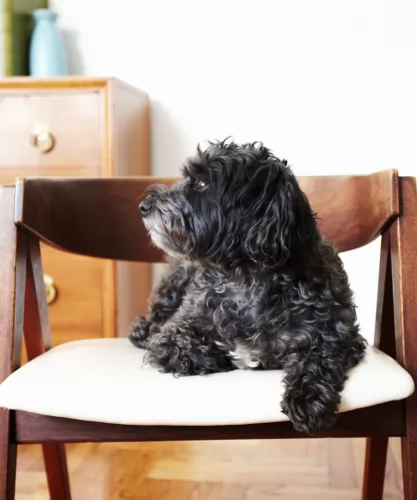 Affenpinscher is a toy size breed and it weights between 2.6 kg to 6 kg. There is no big difference between male and a female dog.
Affenpinscher is a toy size breed and it weights between 2.6 kg to 6 kg. There is no big difference between male and a female dog.
The height of the breed is approximately 23 to 30cm. They have monkey-like expressions, and that is why it got its name. The primary color of the coat is black, but it can be gray, brown, red, white). Every club has a list of acceptable colors. Not all the colors are accepted in every country.
The lifespan of Affenpinscher variates from dog to dog, but it is on average 11.4. That is a typical lifespan of dog that size, but they can live much more depends on the care and health of the dog.
Litter size of Affenpinscher is 1-3 puppies. They are very small dogs, so having a small number of puppies is normal for mini breeds.
Other Names of Affenpinscher are monkey dog, Affen or Affie. All the other names are related to its size and monkey-like look.
 The Dutch Shepherd dog is very similar in appearance to the popular German Shepherds, being a medium to large sized dog.
The Dutch Shepherd dog is very similar in appearance to the popular German Shepherds, being a medium to large sized dog.
The males are slightly heavier than females, but both males and females can stand between 55 and 62cm and weigh between 20 and 32kg.
There are actually 3 varieties found in the Dutch Shepherd dogs - short-haired, long-haired, and wiry or rough-haired. The dog has a double coat, consisting of a woolly undercoat and a top coat. The basic color of the coat is gold or silver through to red, giving rise to the brindle variations. Too much black or white seen in the fur is considered a fault.
In 1914 it was decided that brindle coats would distinguish them from the others.
The eyes of the Dutch Shepherd are dark, almond shaped and slightly slanting, while the medium sized ears are erect and high on the head and the thick tail is slightly curved. The dog has an unusually long tongue which is often found hanging out.
Early training and socializing for this dog is important so that he can learn to stay calm around new people, or visitors to the property.
The beautiful Dutch Shepherd doesn’t like being left alone for too long, loving rather to be involved with all that the family is involved in. They get on well with other pets in the home as well as being child-friendly.
They are happy dogs, who can also be smart and cunning, therefore highly trainable. They soak up new commands easily. Dutch Shepherds are also good watchdogs as they are fiercely loyal, and do not take kindly to strangers.
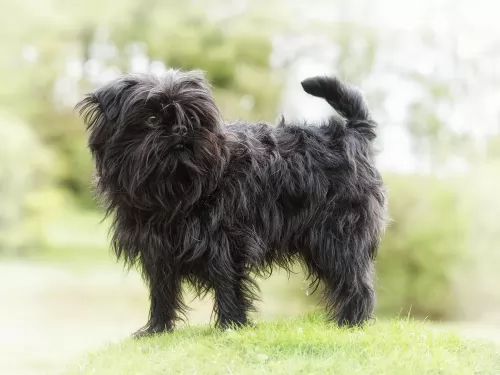 Affenpinscher is a toy sized dog, so they are fragile and you always have to watch out for them. They require a lot of training because they are very stubborn. Breed experts recommend positive training because they can’t respond badly and get depressed if you practice old ways of practice, which include punishments.
Affenpinscher is a toy sized dog, so they are fragile and you always have to watch out for them. They require a lot of training because they are very stubborn. Breed experts recommend positive training because they can’t respond badly and get depressed if you practice old ways of practice, which include punishments.
They tend to bark a lot and can be unfriendly to guests and other animals. It is important to train them properly and to spend as much time as they can with other animals.
The great thing about Affenpinscher is that they are very easy to carry around and they are beautiful little dogs. They are braver than most of the toy dogs because of the terrier descent. The funny thing about them is that they take themselves very seriously which can be very funny to the owners.
They don’t need a lot of exercises. They love walking, but they do not require a lot of it.
Affenpinscher is a great watch dog. They tend to protect the house and they are amazing dogs for watching.
They are not very good with children because they are very sensitive and they love attention. It is also important not to spoil them, even if it’s funny sometimes, it is not recommended to spoil your dog.
 Your alert, intelligent and somewhat rare Dutch Shepherd is a loyal, protective dog, and while he can be aggressive around intruders and be a great guard dog, he can also be a gentle, loving animal around his human family members.
Your alert, intelligent and somewhat rare Dutch Shepherd is a loyal, protective dog, and while he can be aggressive around intruders and be a great guard dog, he can also be a gentle, loving animal around his human family members.
Though his tongue is long and often hangs out, you won’t have to contend with drooling. He is a wonderfully active dog and doesn’t easily gain weight. He isn’t a barker or howler, and his exceptional intelligence makes him highly trainable.
Whether there are children or other animals in the house, you can rely on your Dutch Shepherd to get on well with them, making him a wonderful family pet and canine friend.
 It is very important to choose a quality puppy from a quality breed. Affenpinscher can have some health problems. Hip dysplasia collapsed trachea, and the luxating patella is the most common health complications of this breed. But, the most of the dogs die of an old age, so if you are choosing wisely, and with proper education and consulting, you will have a happy and a healthy dog.
It is very important to choose a quality puppy from a quality breed. Affenpinscher can have some health problems. Hip dysplasia collapsed trachea, and the luxating patella is the most common health complications of this breed. But, the most of the dogs die of an old age, so if you are choosing wisely, and with proper education and consulting, you will have a happy and a healthy dog.
 The Dutch Shepherd dogs are the healthiest of the Shepherd breeds. They have relatively few health problems.
The Dutch Shepherd dogs are the healthiest of the Shepherd breeds. They have relatively few health problems.
However, like the German Shepherds they may develop hip dysplasia, but this is in fact fairly rare. Get your pet to the vet if you suspect this in your dog because it can lead to lameness.
In 2018 the University of Minnesota identified a disease in Dutch Shepherds called Miositis. This is an inflammatory myopathy causing painful inflammation of the skeletal muscle tissue.
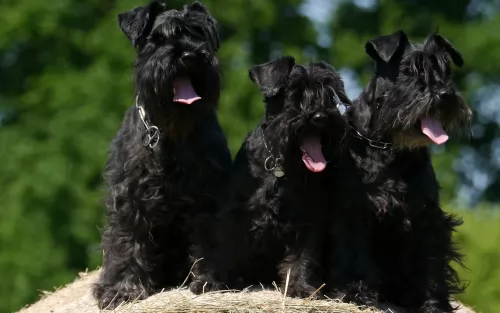 Affenpinscher daily amount food should be based on a size and activity of the dog. But approximately ¼ or ½ cup of high-quality food should be enough for your dog. It is recommended to divide into two meals per day. You can also add some vegetables, oil, meat or fruits into a meal, but only small size portions.
Affenpinscher daily amount food should be based on a size and activity of the dog. But approximately ¼ or ½ cup of high-quality food should be enough for your dog. It is recommended to divide into two meals per day. You can also add some vegetables, oil, meat or fruits into a meal, but only small size portions.
Feeding Affenpinscher puppy is similar to feeding an adult dog. The difference is in a number of meals per day. It is recommended to give 3-5 portions per day for a puppy.
Also giving vitamins and minerals to a puppy dog is very important for health.
Grooming the Affenpinscher could be a challenging task. It requires regular care with every day brushing and cleaning. They have a strong and rough coat. A good side of that is Affen size. They are not big, so there wouldn’t be a lot to groom.
 Unfortunately Dutch Shepherds shed quite a bit of hair during their shedding period in spring and autumn. This makes regular brushing important during these seasons so as to remove the dead hairs, especially from the undercoat.
Unfortunately Dutch Shepherds shed quite a bit of hair during their shedding period in spring and autumn. This makes regular brushing important during these seasons so as to remove the dead hairs, especially from the undercoat.
The wire- or rough-haired variety shouldn’t be brushed but should rather be groomed by a professional groomer every 6 months or so.
Their nails need to be trimmed when necessary, to avoid cracking, splitting, or an injury.
Their ears can be cleaned weekly to get rid of any debris or wax build-up. This, if left, can lead to infection. Brush his teeth 2 or 3 times a week to avoid dental disease which brings on a host of illnesses.
These dogs do need regular exercising, and at the same time need to be physically and mentally stimulated. He is the kind of dog that has been used for herding purpose on the farm and he just craves activity. Take him with you on your walks and include him in ball games, hikes, jogging, swimming or when you go cycling – he is game for all kinds of activities.
The formula for their diet would be that of a medium to large dog with high energy levels. The top commercially manufactured foods have been developed to include all the important vitamins and minerals. Fish oil can also be added to their food to keep the coat shiny.
Add in cooked rice, cooked vegetables and chicken from time to time and be sure to add in some raw meat occasionally to prevent problems with the skin. Always ensure that your pet has fresh, cool water to drink.